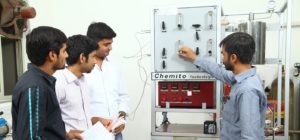
The Chemical Engineering Department at Nirma University, is committed to provide excellence to its students by providing them high quality teaching-learning in state-of-the-art laboratories, well-equipped infrastructure, qualified and committed faculty members and serene ambience. It comprises of highly motivated faculty members with strong research and academic experience. Their expertise cater to diverse domains in Chemical Engineering, Environmental Engineering, Energy Engineering, Chemistry, Polymer Technology, which equip the students with strong fundamentals, awareness of modern concepts and competent skill set. The faculty members of the department are actively involved in research and development in various areas like catalysis, advanced wastewater treatment, thermodynamics, energy, green processes, nanotechnology, polymers, etc. They are also actively involved in consultancy projects of environmental audit. The faculty members and students have won several prestigious national awards from various organisations like Indian Society for Technical Education (ISTE), Indian National Academy of Engineering (INAE), Indian Institute of Chemical Engineering (IIChE), Society of Automotive Engineers (SAE) , Association of Chemical Technology (India), etc.Students at the Department of Chemical Engineering cater the engineering knowledge. The focus of teaching learning process is given to understand basic and advance level of engineering science and to solve the practical and complex engineering problems. Starting from the 2nd year of the program, emphasis is given in identification of the engineering problems, survey of the research literatures, analysis of the results and reaching to the substantial conclusion of the complex problem. They also acquire the knowledge to design and solution of complex engineering processes and the system components that meet the specified needs with appropriate consideration for the public health and safety, cultural, societal, and environmental considerations.
Experienced faculties from the department shape the student’s career in such a way that they do not only excel in the field of production and management but they also outshine in R&D and research areas. Every year a 10 to 15 % of students from the department of Chemical Engineering qualify for the higher education through different competitive examinations like GATE, GRE, TOEFEL etc. Over the last five years, more than 80 students form the department have opted to pursue higher education in different premium institutes of India and abroad such as IITs and the top-Q1 universities around the world.
Please find the department’s LinkedIn handle here:(15) Chemical Engineering Department Nirma University: Overview | LinkedIn
The curriculum of chemical engineering is designed to prepare graduates to attain the following program-specific outcomes: